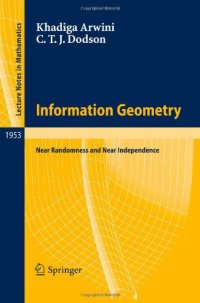
Ebook: Information geometry: Near randomness and near independence
- Genre: Mathematics // Geometry and Topology
- Tags: Differential Geometry, Probability Theory and Stochastic Processes, Statistics for Engineering Physics Computer Science Chemistry and Earth Sciences, Continuum Mechanics and Mechanics of Materials, Genetics and Population Dynamics
- Series: Lecture Notes in Mathematics 1953
- Year: 2008
- Publisher: Springer-Verlag Berlin Heidelberg
- Edition: 1
- Language: English
- djvu
This volume will be useful to practising scientists and students working in the application of statistical models to real materials or to processes with perturbations of a Poisson process, a uniform process, or a state of independence for a bivariate process. We use information geometry to provide a common differential geometric framework for a wide range of illustrative applications including amino acid sequence spacings in protein chains, cryptology studies, clustering of communications and galaxies, cosmological voids, coupled spatial statistics in stochastic fibre networks and stochastic porous media, quantum chaology. Introduction sections are provided to mathematical statistics, differential geometry and the information geometry of spaces of probability density functions.
This volume will be useful to practising scientists and students working in the application of statistical models to real materials or to processes with perturbations of a Poisson process, a uniform process, or a state of independence for a bivariate process. We use information geometry to provide a common differential geometric framework for a wide range of illustrative applications including amino acid sequence spacings in protein chains, cryptology studies, clustering of communications and galaxies, cosmological voids, coupled spatial statistics in stochastic fibre networks and stochastic porous media, quantum chaology. Introduction sections are provided to mathematical statistics, differential geometry and the information geometry of spaces of probability density functions.